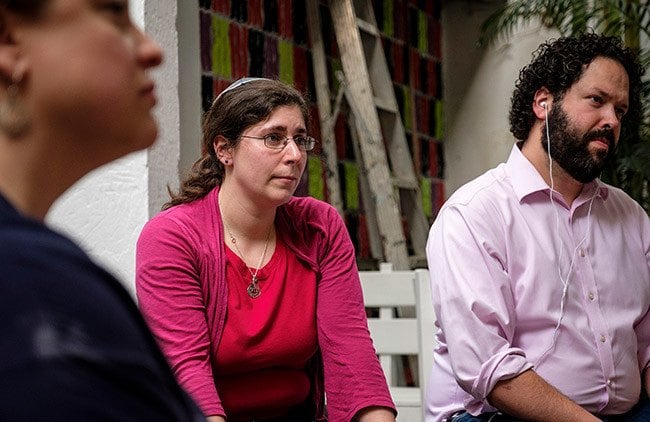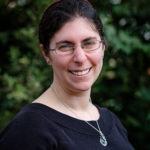Omer: A long stretch of spring, days both full and interminable. Each night I flip a page of my Omer counter, recite the blessing and add a new day to the count. In my head, I add the extra time from the night we closed our synagogue’s physical doors, as COVID-19 began its deadly spread.
Jews count seven weeks of the Omer between our Exodus from Egypt, the 2nd night of Passover, and Shavuot, when we enter into covenant with the Divine. The time of the Omer is a time of ripening. The first barley harvest grows fat on its stalks, and our souls, too, ripen. The Kabbalistic tradition takes these weeks to explore the seven earthly emanations of the Divine: chesed (lovingkindness), g’vurah (boundaries), tif’eret (splendor or balance), netzach (endurance), hod (humility), y’sod (intimacy) and malchut (reign or responsibility). Each day also has its own character, and so every day is governed by two impulses.
Our invitation is to find and refine their embrace within ourselves. But the mitzvah is simply to count. Day by day. Week by week. Trudging towards Torah, which will arrive on day 50, in a sun blaze on eyes heavy-lidded with study.

Photo by Christopher Dilts
Within this finite count, a particular day has stayed with me: Day 22. Chesed sheb’netzach—lovingkindness in endurance. It’s close to the middle of the Omer, the crest of the hump from slavery to Sinai. But here in quarantine, we don’t know the midpoint because we don’t know how this disease will progress. Netzach is our daily definition. Right now, “endurance” feels like a narrowing, the way the space I move in has contracted. We are here—we are still here, hunkered down against this storm. We see fewer people, we do fewer things. We try to survive.
But within this context of endurance—oh, the acts of lovingkindness that are emerging! How unstoppable the urge to care for one another! The 70-year-old who makes care packages and hand-delivers them to long-term care facilities. The person who lives close to the bone asking if anyone needs groceries. The truck driver at his uncle’s graveside, using the shovel he brought from home to cover the casket with earth. Perhaps the intensity of endurance calls forth lovingkindness, the heart-opening and deeply satisfying opportunity to do for others what they cannot do for themselves.
In our work of endurance during quarantine, we must re-orient ourselves towards each other. This year, I participated in AJWS’ Global Justice Fellowship. The Fellowship trains American rabbis and cantors to become advocates for human rights and build a more just world. During a recent virtual advocacy training, I began again to stretch my concern beyond our country’s borders. After a few weeks of fear, isolation and upheaval, my energy had turned inward—to my kahal, my county, my state. Every morning I found myself reading only the local papers, and my concerns had been about my community: How do we run religious school? How do I livestream services? Who’s living alone?
Absorbing, integrating and responding to information about the people in the Global South whose governments are corrupt and whose medical systems are inadequate—Guatemala, reportedly, is handing out lemons and salt as prophylactics; the Rohingya people of Burma are still crammed into refugee camps in Bangladesh—felt like being forced out of fetal pose. My body fought it, wanting to stay curled and protected around my internal space. But when we cling too tightly, we cramp up. We can’t open up to each other’s needs, and we can’t act to meet them.
As we count these days, these weeks, we long for an “end in sight.” But the counting of the Omer invites us to shift, to focus on cultivating qualities that will allow local and global communities to survive the pandemic and thrive afterwards. Can we balance our personal needs with the needs of people who were already experiencing homelessness, starvation, poverty and ill health? Can g’vurahand malchut help us diminish the coronavirus contagion and the staggering socioeconomic inequalities and prejudices that disproportionately inflict it on black and brown communities? And can we develop the humility to say that learning treatment and cure—just like learning Torah—must be a global effort?
Soon we’ll stand at Sinai together, ready to receive Torah. Our imperative, as we answer the call of commandment, is clear: Rise to our feet as one global community. Leave no one behind. Share what we learn and use it to move forward together—as a world in which the health and dignity of every person is as important to us as our own.
 Cantor Vera Broekhuysen is the Spiritual Leader and Senior Clergy at Temple Emanu-El of Haverhill in Haverhill, Massachusetts.
Cantor Vera Broekhuysen is the Spiritual Leader and Senior Clergy at Temple Emanu-El of Haverhill in Haverhill, Massachusetts.
AJWS’s work in countries and communities changes over time, responding to the evolving needs of partner organizations and the people they serve. To learn where AJWS is supporting activists and social justice movements today, please see Where We Work.
